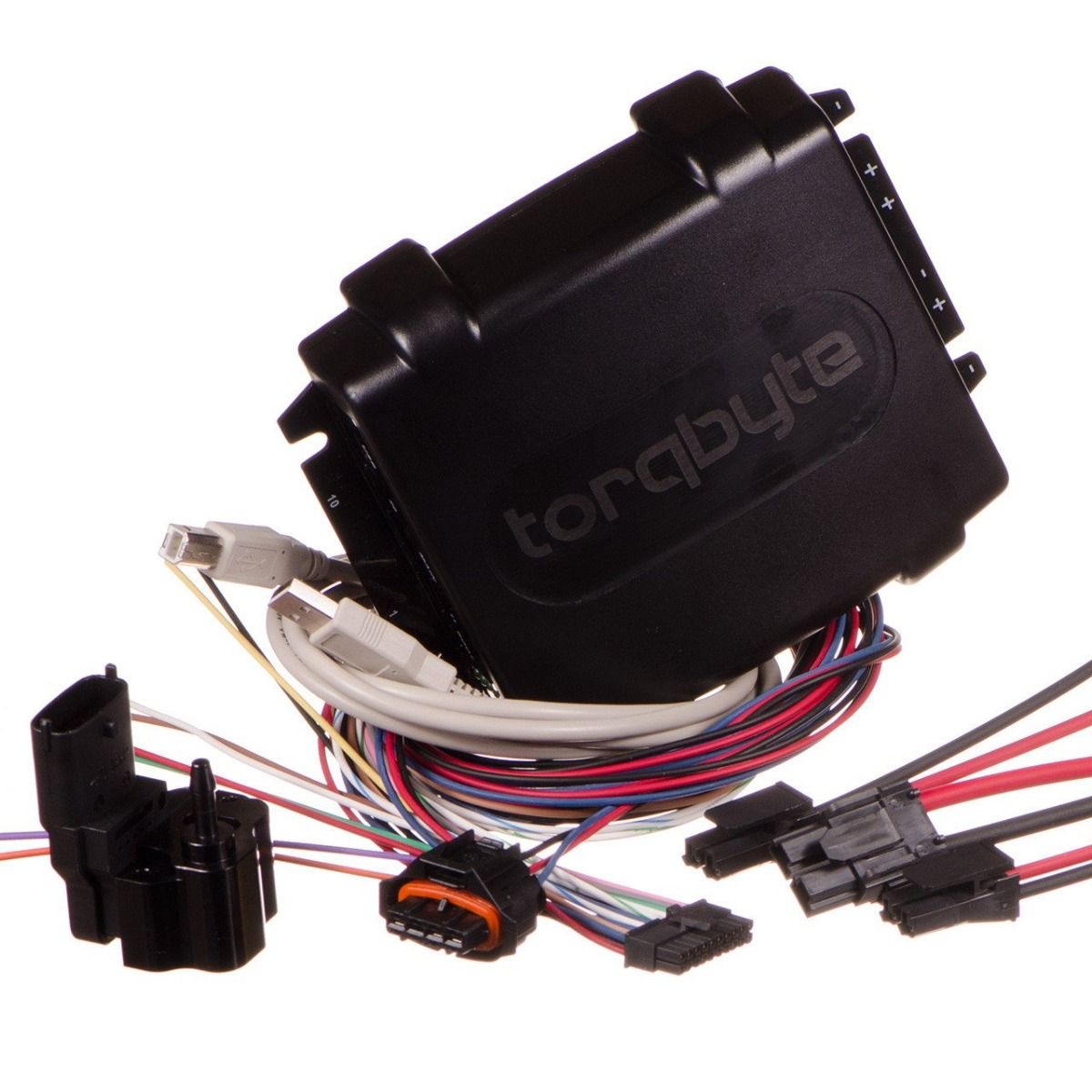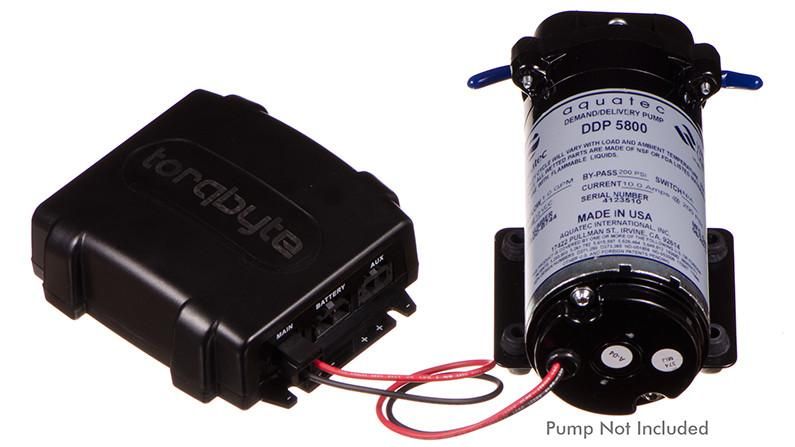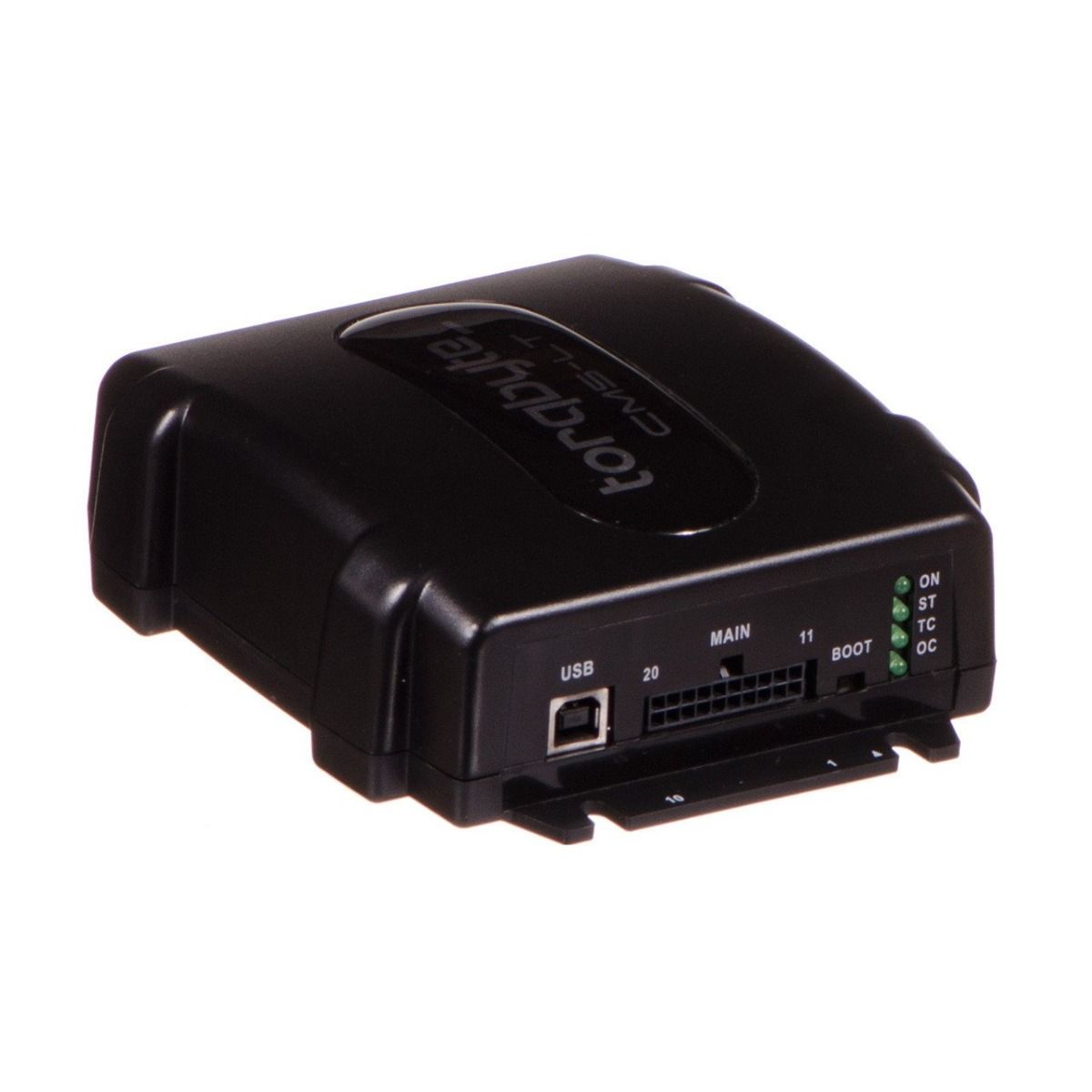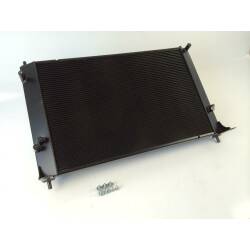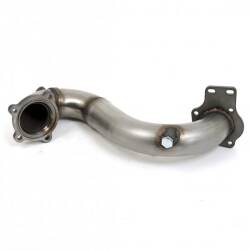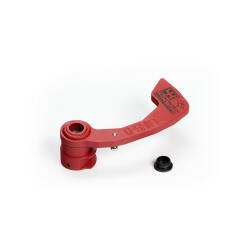Description
As the next generation of the highly popular CM5-LT, The Torqbyte CM5-LTS is the most advanced programmable water methanol pump controller on the market. It is capable of simultaneously driving two individually-controllable water methanol injection (WMI) pumps and four individually controllable anti-siphon solenoids, Fast Acting W/M injection valves, auxiliary high impedance injectors or any combination thereof. Each of the CM5-LTS’s two pump outputs is capable of supplying up to 15A to the connected pump.
Base CM5-LTS Kit
The base CM5-LTS kit Includes the following:
- CM5-LTS Controller
- 4Bar Honeywell Pressure Sensor (Metri-Pack 150 installed on the Input / Output Harness)
- 12ft (3.6m) Input / Output Harness
- 12ft (3.6m) 12AWG Power Harness
- 12ft (3.6mm) 14AWG Pump Harness
- USB Cable
Optional Hardware
- Ruggedized Low-Profile Metal Enclosure
- Power / Grounding Accessories with a 40A Fuse and Fuseholder
- Second Pump Harness
- Input / Output Expansion Module
Optional Input / Output Expansion Module
CM5-LTS can interface with up to 2 flow sensors, an optional dash-mounted LCD display (or gauge), 0-5V analog inputs or the vehicle’s CANBus network.
This additional functionality can be accessed via the optional I/O Expansion Module.
Water Methanol Control Strategies
VPD: Variable Pump Duty
The usual North American water methanol kit suppliers all utilise a control strategy that adjusts the flow of the injected water methanol mixture by “progressively” varying the speed of the delivery pump in relation to manifold boost pressure or the MAF sensor output. These S.A.D. progressive controllers all use manual entry of the start boost/MAF set point and the full boost/MAF switch over. The controller then implements an imaginary straight line between these two points and mindlessly varies the pump duty back and forth along that line. The S.A.D. progressive controllers don’t allow for logging and analysis of the injection system performance. They are as crude and unsophisticated as it gets without using a hobbs switch wired directly to a pump, but are widely used because they require very little effort to operate.
FPD-VSD: Fixed Pump Duty – Variable Solenoid Duty
A European Water methanol kit supplier utilized a completely different control strategy that adjusts the flow of the injected water methanol mixture by varying the duty of a “fast response valve” which is placed upstream of a delivery pump whose duty is held constant, usually at 100%, and whose internal bypass is used to keep the line pressure somewhat constant. This is a much more sophisticated technical approach with a higher overall delivery bandwidth which allows the injection system to react to changes much quicker than the crude S.A.D. progressive controllers. This control approach also lends itself well to modern direct injection set-ups. The placement of the “fast response valve” naturally prevents siphoning which is a problem in modern direct injection set-ups that see the injection nozzles exposed to manifold vacuum.
Torqbyte Control Strategy: Up to the User
The S.A.D. progressive controllers can only drive a single delivery pump. They also usually have only a single channel for driving an optional anti-siphon on/off solenoid valve. This makes them somewhat less than optimal for use in direct injection set-ups or staged set-ups that require a lot of stages.
The higher-end European controllers can only drive a single delivery pump and one “fast response valve”. They cannot be configured for multiple stages of delivery, but they are provided with optional direct injection manifolds for 4, 6 and 8 cylinder configurations.
Torqbyte CM5-LTS can drive two delivery pumps and two on/off solenoids or two “fast response valves” or one of each solenoid type. With the CM5-LT, the users can implement a VPD control approach based on RPM, boost or another 0-5V signal of their choice. They can also implement the FPD-VSD control strategy that is based on RPM, boost or another 0-5V signal. Because the CM5-LT has two PWM pump outputs and two General Purpose outputs (GPOs) which can either drive On/Off solenoids or PWM “fast response valves”, the user can implement a hybrid VPD/FPD-VSD control strategy or something completely new and unique. The CM5-LT also interfaces directly with the hardware provided by the S.A.D. progressive controller suppliers as well as the European controller suppliers, so upgrading your existing system to use a CM5-LT is simple and straightforward.
One Stage – Intake mounted nozzle
One Stage – Direct Injection / Manifold mounted nozzle with anti-siphon solenoid
Two Stage – Intake mounted nozzles
Two Stage – Direct Injection / Manifold mounted nozzles with anti-siphon solenoids
Three Stage – Intake mounted nozzles
Three Stage – Direct Injection / Manifold mounted nozzles with anti-siphon solenoids
Four Stage – Intake mounted nozzles
TorqTune Software
In spite of its sophistication, CM5-LT is extremely easy to install and configure with our intuitive TorqTune PC software.
This free software allows users to fully configure the operation of the Torqbyte CM5-LT. Certain parameters, such as duty cycle maps, can be adjusted with the engine running for real-time tuning. Additionally, TorqTune allows the user to live view many of the unit’s internal parameters, log them to a file and save them for later playback or for sharing with others. These advanced functions allow the user to observe the effects of various configuration changes in order to achieve unprecedented control of their methanol injection and/or fuel pump operation.
TorqTune software can store your CM5-LT’s configuration settings in special TTINI files that you can store on your hard drive or share with other CM5-LT users. Other users’ configuration files can be loaded into your CM5-LT and used “as-is” provided your set-up is the same as the other user’s or they can be used as a starting point for your own customization. TorqTune software can also log and play back saved log files which can be analysed in TorqTune or in Excel. These features make the CM5-LT and TorqTune ideal for tuners who need to work on their customers’ vehicles remotely.
The feature set provided by Torqbyte CM5-LT and its accompanying TorqTune software is not available with any other water methanol injection or fuel control system.
A Controller that Evolves with your Setup
If you don’t need all of the CM5-LT’s advanced functionality right away, you can use TorqTune to configure the CM5-LT to operate as a dumb “progressive” controller equipped with two adjustment trim-pots for manually setting the pump activation boost point and the “full pump speed” boost point.
If you own a CM5-LT you won’t need to purchase a new controller with additional features as your set-up evolves and your water methanol injection system gets more complex. The CM5-LT will grow with your set-up making it the last water methanol controller you will ever need to buy.
CM5-LT is designed to be future-proof. Its internal unit firmware can be upgraded from your PC so you can continue to take advantage of new features and enhancements as they are rolled out. Simply download the latest firmware from our website and reflash your CM5-LT from the TorqTune software. As always, all firmware and software updates are free for all our customers and our dealers.
If you already have a competitor’s water methanol kit installed, but need more flexibility, the CM5-LT can control all the existing hardware in your water methanol set-up. Simply toss out that “progressive” controller and with a few simple wiring modifications you’ll be on your way to being in full control of your water methanol delivery.
CM5-LT block diagram is shown below:
Industry’s First TRUE 3D WMI Pump Duty Mapping
Nearly all other commercially available water methanol injection kits come with crude pump controller electronics packaged inside economy hobby electronics enclosures or gauge pods. These open-loop controllers vary the pump speed based a single parameter – usually boost pressure. They are often called “progressive” controllers presumably because they “progressively” increase the pump’s duty relative to boost pressure. However, no consideration is given to air volume or engine load and the user is not provided with any useful means of fine-tuning the linearly-varying water methanol pump speed or customizing the water methanol delivery to account for non-linear engine operation. These limitations result in the same quantity of water methanol mixture being introduced into the cylinders at all engine speeds. This is clearly a less than optimal approach.
In order to establish accurate and predictable water methanol injection, a good estimate of air volume is required. Torqbyte CM5-LTS is the only controller on the market that accurately establishes the air volume by calculating pump duty based on two parameters: boost pressure and engine speed. The CM5-LTS’s water methanol injection delivery is fully digital and is completely customizable by the user through a 16×16 table (i.e. a 256 point map) which is downloaded into the unit.
Other water methanol kit providers state that their pump controllers are “digital”, but what do they really mean by that. Sure, some of them come with a basic “digital” display that shows parameters like boost or pump duty, but how truly “digital” is their internal operation? As a true digital controller, the CM5-LTS is built around a fast microprocessor that performs 2-dimensional linear interpolation simultaneously in both vertical (boost or voltage) and horizontal (RPM) axes to generate pump duty values which change smoothly and gradually between all adjacent table cells. This is the same algorithm used in today’s modern Engine Control Units (ECUs).
Need extra water meth at a certain RPM & boost point, in an otherwise linear map? No problem
Need to add a small dip in water meth delivery required at another RPM & boost point? No problem.
The other controllers simply don’t provide this level of flexibility, especially not in one unit that can control four outputs each with its own unique configuration table.
Torqbyte CM5-LTS is supplied with a 4-Bar MAP sensor, but the TorqTune software allows you to configure the unit to use any 0-5V MAP or gauge pressure sensor of your choice. This is an important if you are using the CM5-LTS on something like a high-performance diesel set-up that sees up to or over 4Bar of boost.
If you do not want to base your water methanol injection on RPM and boost, you don’t have to. Pump duty can be based on just RPM or just boost.
Don’t want to base the Water Methanol Injection control on boost pressure? Want to use some other 0-5V sensor or signal? No Problem. Select what you want to use for the vertical axis source
If other exotic or unorthodox water methanol control schemes are required, the CM5-LTS’s two spare 0-5V analogue inputs can replace boost as the vertical axis in each of the tables so you can base the pump duty on another 0-5V signal, such as the MAF or the TPS. You could even base your water methanol delivery on the 0-5V output of an O2 sensor controller or even a simple manual pot. With Torqbyte CM5-LTS, you are in full control of your WMI pump operation at all times allowing you to make it fit virtually any vehicle or engine set-up.
The CM5-LTS always stores the user-loaded 3D duty maps in its on-board, non-volatile memory. TorqTune software can store these maps in calibration files and allow them to be saved, opened, edited and shared. Pump duty cycle, boost, RPM and a number of other parameters can be logged and played back using the TorqTune software. Users can easily edit and customize the water methanol delivery calibrations for their specific engine configuration.
Low Power Outputs
Besides the two high power pump outputs, Torqbyte CM5-LTS also provides you with four low power General Purpose Outputs (GPOs) whose operation is also fully customizable through their own dedicated 256 point map tables that can vary the duty of each GPO based on engine RPM plus another 0-5V parameter such as boost pressure or a spare analogue voltage.
The low power GPOs are pull-to-ground type outputs and are capable continuously sinking up to 1A from each attached load. A typical use for the GPOs is controlling staged injection solenoids or an anti-siphon fluid control solenoid which prevents methanol water mixture siphoning in set-ups where the water methanol pump is mounted below the water methanol tank or where the water methanol nozzles are mounted behind the throttle plate and can leak while exposed to engine vacuum. This same solenoid can also be used to restrict fluid flow momentarily before injection allowing the water methanol pump to build line pressure and ensure better atomization of the water methanol mixture when the solenoid opens.
Another popular use for the GPOs is controlling an additional high-impedance injector. This additional injector can provide additional fuel when the user’s set-up has outgrown the capabilities of the stock injectors. In addition to improving the overall fuel delivery, the additional injector can sometimes help alleviate the problems typically seen in direct injection systems, such as carbon build up.
Other uses for these outputs are activation (or deactivation) of loads such as relays, lamps or LEDs that can be used to control other systems in the vehicle or provide visual indication to the driver based on the 256 point table configuration.
Spare Analog Inputs
Torqbyte CM5-LTS comes with two spare 0-5V analogue inputs. Either of these spare inputs can be used to control any of the four 256 point tables instead of the default MAP sensor.
Weather the two spare analogue inputs are used instead of the MAP sensor to control the duty of one of the outputs or not, both can still be used for live-viewing and/or data logging allowing the user to record and analyse parameters including, intake or exhaust temperature, throttle position (TPS), Mass Air Flow (MAF) reading, water methanol Flow Sensor output or Air/Fuel Ratio (AFR) taken from a Wideband O2 sensor controller.
Spare Logic Inputs
Torqbyte CM5-LTS provides the user with two active-low logic inputs. An open circuit on these two inputs is considered inactive. However, connecting either of these inputs to ground, through a switch or a relay, signals an active state to Torqbyte CM5-LTS and allows it to take a pre-defined action.
For example, if the user has configured the CM5-LTS for boost control, these inputs can be used to select between two boost set-points or put the car in valet mode where the boost is set to the lowest possible (i.e. wastegate spring) boost level.
Many other uses are certainly possible and are only limited by the user’s configuration.

